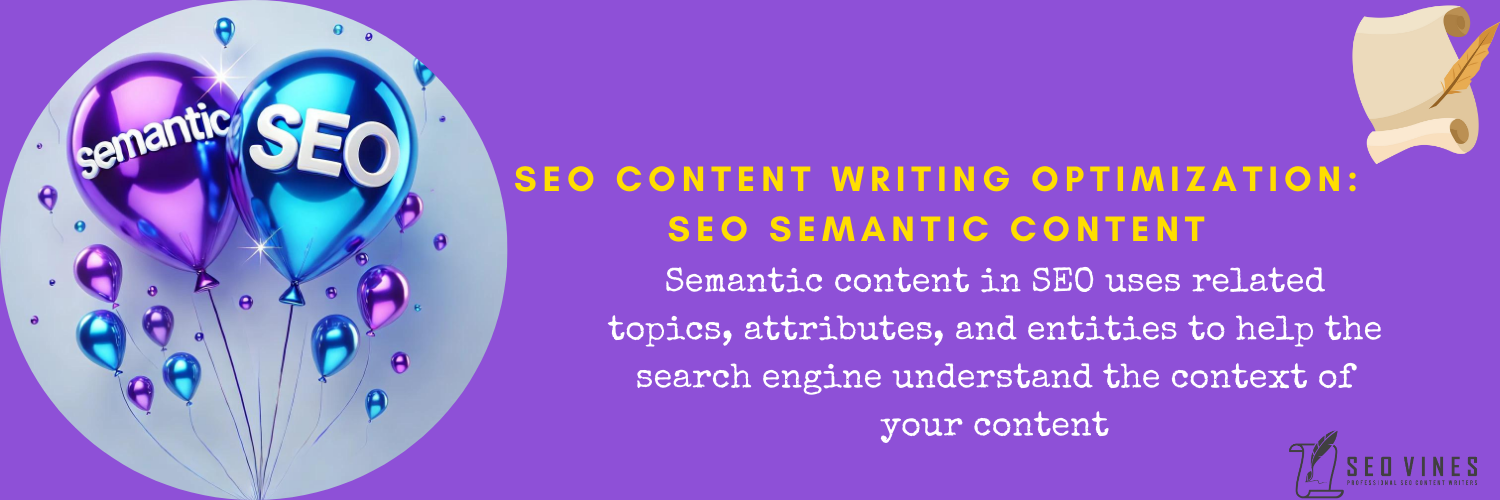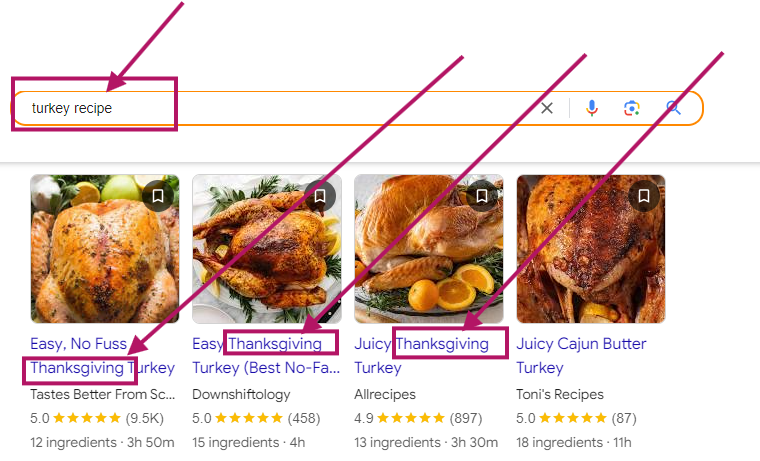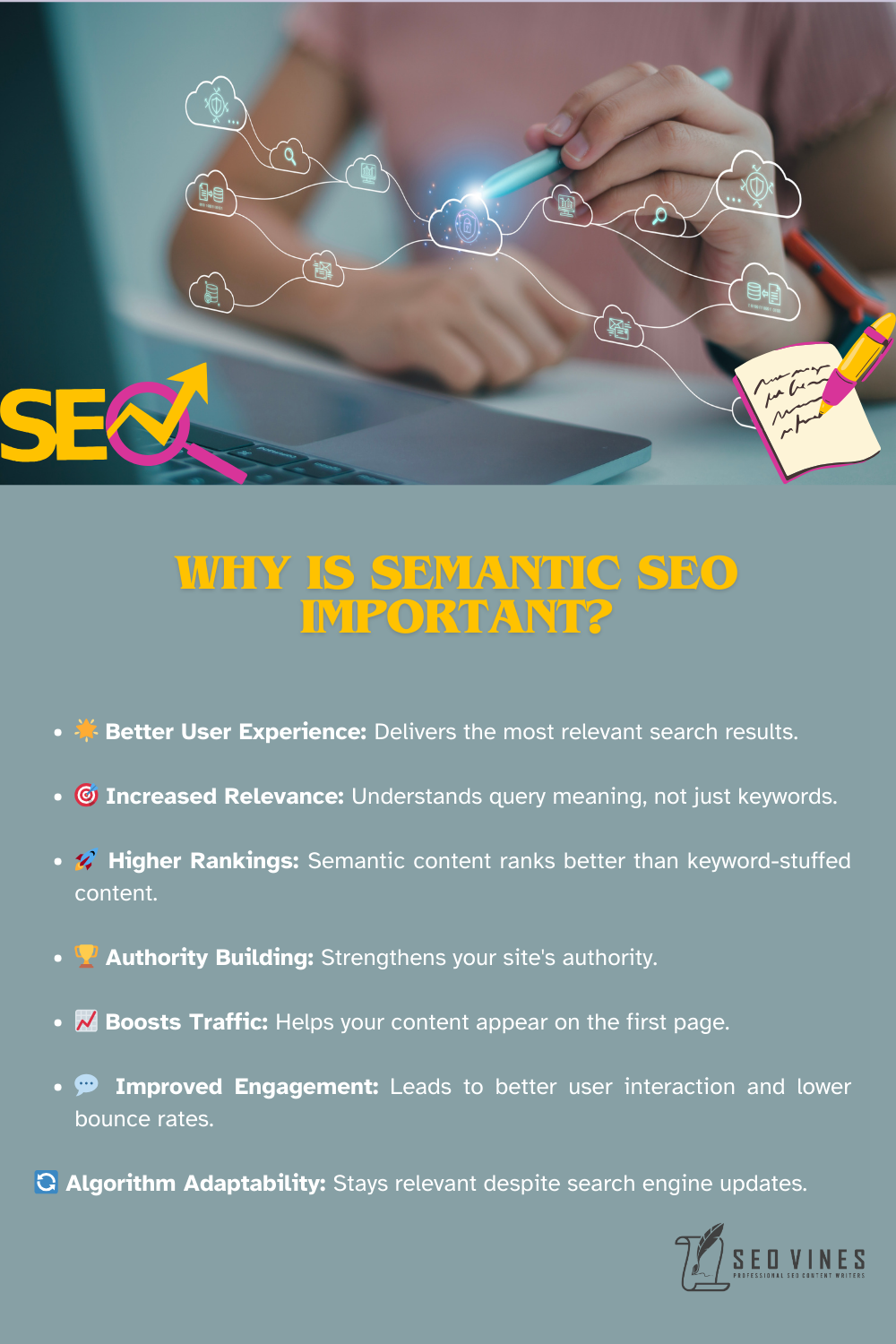Table of Contents
SEO Content Writing Optimization: SEO Semantic Content
By Benson Reed, Posted: September 3, 2024

Semantic SEO uses topics, attributes, and entities to help the search engine understand the content. It is understanding the meaning behind the words or phrases used in the content. Semantic SEO links the search engine to human language, making it easier for the search engine to interpret human language.
SEO semantic content is optimized content for search engines, with related attributes and entities to help the machine understand what people are searching for. Keywords used to be the way we communicated with the search engine. Today, semantic SEO is taking over, where the search engine can understand the context of your search query based on the words used.
If you want to rank higher on search engines today, you must understand semantic SEO.
What is Semantic Content in SEO?
According to Bill Slawski (2021), Semantic content in SEO uses related topics, attributes, and entities to help the search engine understand the context of your content. For instance:
Search term: “How to carve” This can mean carving wood, carving turkey or carving on skis
Search term: “How to carve a turkey” By adding “turkey” the search engine understands you are talking about preparing a turkey.
With this, SEO semantic helps in giving results related to turkey preparation, seasons, and ways to cook a turkey. In keywords-based SEO, the results would have shown only ways of carving a turkey.
What Is Topical Authority in Semantic SEO?
According to Koray Tuğberk GÜBÜR (2024), topical authority is expertise and trustworthiness that the search engine treats content or a website based on the topic or subject area. With Semantic SEO, topical authority is the relevance of content based on the given topic, attributes, and entities.
For instance, topical authority in preparation of a turkey would mean the content creator has covered turkey core topics, and related subtopics and interlinked them with “turkey preparation” topics.
What Is Semantic in Content Writing?
Semantic content writing is writing for the search engine utilizing topic key attributes and entities while making sure to cover related topics without diluting the contextual connection.
A good example of semantic topics in SEO: is “turkey grilling” which is closely connected to “poultry grilling tips”, but not closely related to “baking a chocolate cake”.
According to Searchenginejournal (2024), semantic in content writing plays a key role in content ranking and indexing, based on updated search engines. This makes it crucial to understand semantic SEO or hire SEO content writers who understand semantics to take advantage of semantic search.
Today, SEO content writing agencies are taking advantage of advancements in SEO semantics to train their SEO content writers. SEO semantic-equipped writers create content based on entities, attributes, and vectors, increasing ranking and indexing factors.
What is Semantic Search?
Semantic search is the way that the search engine uses and matches attributes and entities to understand the intent behind a user query. Semantic search goes beyond matching keywords, to relating entities to topics.
For example: when looking for “turkey recipe” using semantic search the SERPs would include results talking about “Thanksgiving”

This implies that “Thanksgiving holiday” is closely related to “turkey recipe”.
How Does Semantic Search Work?
Therefore, semantic search works by utilizing entities and attributes and looking for the most related topics to these attributes. When writing SEO content, you must make sure you relate your entities and attributes to the main topic. This makes it crucial to hire SEO writing agencies that understand SEO semantic content writing.
Why Is Semantic SEO Important?
Semantic SEO is important in search engine ranking for the following reasons
- Improved User Experience: It makes it easy for users to get the most relevant search results from their queries.
- Increased Relevance: helping the search engine understand the meaning behind search queries rather than just keyword matching.
- Enhanced Content Discoverability: SEO semantically written connect is easy to rank higher than keywords staffed content.
- Authority Building: Builds authority when your SEO content meets SEO semantics.
- Higher Ranking and Traffic: With semantic content search engines will show your content on the first page.
- Better Engagement Metrics: SEO Content that is semantically optimized engages users better, resulting in lower bounce rates.
- Adaptability to Search Algorithm Changes: SEO semantic helps content to withstand core updates, hence your SEO content is more likely to remain relevant even after the core updates.

Professional SEO article content writers are going further and learning SEO semantics on their own, while SEO blog writing companies are training their content writers in SEO semantics. As a client, gauge the understanding of SEO semantics before hiring professional SEO articles or blog writers.
Does Google Have Semantic Search?
Yes, Google has integrated semantic search into its search engine capabilities over the years. Initially, Google relied on keywords to process search queries, but with changing technology, Google adopted semantic search technology.
Hummingbird Update (2013) was the first shift to semantic search, then Knowledge Graph in (2012), RankBrain (2015), BERT Update (2019), and MUM (Multitask Unified Model) (2021).
So, we can say Google today fully utilizes semantic search. This means all your SEO content should be semantically optimized.
Why Does Google Use Semantic Search?
Google search semantics SEO is to help users get the most reliable answer to their search query. When users get the most correct answer, Google benefits from user satisfaction.
Does Bing Have Semantic Search?
Yes, Bing utilizes semantic search which is supported by NLP to understand and process search queries and give the most correct answer.
Do Social Media Websites Have Semantic Search?
Yes, many social media websites use search semantics. Facebook for instance uses Graph Search (Launched in 2013) and X (formerly Twitter) uses Contextual Search.
What Is the Difference Between Keyword and Semantic SEO?
The following table shows keywords vs semantic SEO search strategy
| Aspect | Keyword SEO | Semantic SEO |
| Focus | Targets specific keywords and phrases | Focuses on the overall meaning and context of content |
| Content Creation | Content is created around specific keywords to match user queries | Content is created to comprehensively cover a topic and answer various related queries |
| Search Query Matching | Relies on exact or close keyword matches | Understands user intent and provides relevant results even if exact keywords are not used |
| User Intent | May not fully capture user intent, leading to irrelevant results | Prioritizes understanding and fulfilling user intent, leading to more accurate results |
| Context Understanding | Limited understanding of the context surrounding the keywords | Considers the broader context and relationships between concepts in the content |
| Ranking Factors | Ranks pages based on keyword density, placement, and backlinks | Ranks pages based on topical authority, content depth, and user engagement metrics |
How Do Keywords Affect Semantic SEO?
Keywords affect semantic SEO content, in defining attribute entities, but they do not have as much impact as they used. SEO article writers do not have to rely on keywords to optimize content. Professional SEO content article writers will only exhaustively write about the given topic, making sure to use topic-related entities and attributes.
What Keywords Work Best for Semantic SEO?
The best keywords for semantic SEO should be based on topic entity attribute synonyms, related terms, taxonomy, Ontology, etc.
How to Improve Your Semantic SEO?
To improve semantic SEO, you need to invest in understanding semantic search. You also need to train your SEO article and blog writers to utilize semantic SEO successfully and reduce reliance on keywords only. SEO keyword ranking is being replaced by semantic topic ranking and vector search. SEOVINES We have trained our writers to write SEO semantic content. Hiring our SEO content writers guarantees your content will meet semantic requirements.
Does Semantic SEO Help in Ranking?
Yes, Semantic SEO helps in improving search engine rankings helping your website rank on the first page of Google. Semantic written content means it meets the required topic coverage. It also means the written content links to semantically related content. This is an added advantage to meeting and aligning with Google’s E-E-A-T (Experience, Expertise, Authoritativeness, and Trustworthiness) (Google 2023). and overall traffic growth.
How does Semantic SEO help in ranking?
- Enhancing E-E-A-T by exhaustively covering a given topic.
- Increasing Google Traffic from Broader Keyword Coverage.
- Increasing user engagement by meeting user query demand
- Help ranking for entities and attributes that are key for voice search
Who is Koray Tuğberk GÜBÜR?
Koray Tuğberk GÜBÜR is the CEO of Holistic #SEO & Digital. He is an expert in Semantic SEO and Technical SEO. Koray talks about the importance of topical authority in SEO content writing. Through his YouTube videos and course, Koray talks about the importance of content strategy. As an SEO you need a topical map and a content brief to organize your content.
What Is a Topical Map in Semantic SEO?
A Topical Map in Semantic SEO is a strategic framework that organizes and connects attributes and entities of content around a central topic, ensuring comprehensive coverage of the subject matter.
What Is a Content Brief in Semantic SEO?
A content brief in semantic SEO is a detailed guide that outlines contextual vector, contextual hierarchy, and contextual structure that a professional SEO content writer should follow to meet SEO semantics.
SEOVines creates content strategy at a fair price. We use SEO semantics to create extensive and comprehensive topical maps and content briefs covering ranking queries and keywords.
What Does Google Documents Leaked Say About SEO Semantics?
One key takeaway from Google’s leaked document is its strong emphasis on understanding the context and entities mentioned within the content. The leak stresses the need for quality content that meets the user’s intent. This implies writing deeply, covering user queries, and avoiding thin SEO content.
With search engines relying on semantic search, writing SEO content requires understanding SEO semantics. To remain competitive in the industry, hire SEO content writing services that understand SEO semantics.